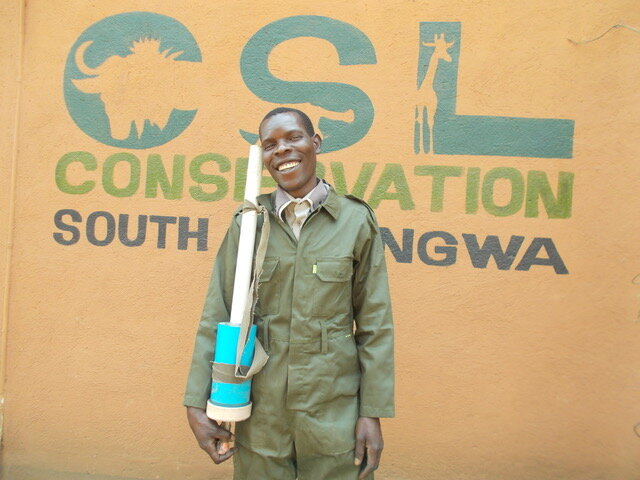Living in Harmony with Elephants
As most of our readers know, AHF supports Conservation South Luangwa (CSL) whose mission is to protect the amazing wildlife in Zambia with a focus on the endangered elephant herds of the valley. We often feature CSL’s anti-poaching patrols and efforts in these blogs. But an equally important part of CSL’s work is in the area of Human-Wildlife Conflict (HWC). This work requires persistence, creativity and the cooperation of local Zambian villagers.
Chilli patroller Misael Phiri, holds a chili bomber device.
Misael, a Chili Patroller in Zambia
By Ruth Chitindi, CSL HWC Database Manager
Elephants are incredible creatures that play a critical part in the eco-system of South Luangwa Valley. But they are also destructive and dangerous to local villagers, damaging crops either by eating them, or by stepping on them and compacting the soil. A whole field can easily be destroyed by elephants in one night. Ongoing conflict with elephants can result in total crop failure, meaning rural farmers have nothing to harvest and feed their families.
So far in 2020, HWC has assessed 360 incidents of elephant crop damage in the area at an estimated cost of $7,800 (though this figure could be higher due to under-reporting). When you consider the daily living cost in rural Zambia is $1 per day, you can see how devastating this damage can be to a family and a community.
To protect the crops and the elephants, CSL’s Human-Wildlife Conflict (HWC) unit initiated a “chili bombing” strategy, and one of our very first volunteer chili patrollers is Misael Phiri.
Misael is a Zambian citizen who lives near South Luangwa National Park, a park normally filled with international tourists who come on safari to see the abundant wildlife. He’s 39 and married with two young daughters, aged 4 and 10. He’s been working as a chili patroller for 14 years. Misael started this work because he had compassion for his fellow subsistence farmers who were laboring in the fields.
Chili patrollers are volunteers chosen by the community to help scare elephants away from fields to protect crops. They use a homemade chili bomber gun to fire a ping pong balls loaded with chili liquid at elephants. This method doesn’t harm the elephant in any way but it does turn them away.
Misael likes being a chili patroller, although it is dangerous and sometimes his own field gets damaged while he’s helping others. Mostly his patrols go well. He fires his chili bomber device and the elephants run away. Occasionally he’s been chased by elephants when he disturbs them during feeding. He likes working as a group with his fellow chili patrollers.
Misael says his work as a patroller also reduces poaching because people know he works under CSL and so his presence prevents people from going to poach.
As a conservationist Misael says, “It feel goods to conserve rather than to destroy our heritage.”
As the population increases, finding solutions to reduce the cost to local communities of living alongside wildlife and promoting peaceful coexistence will be critical for any conservation success.
For more information on CSL’s work & Human-Wildlife Conflict Mitigations, please visit our website www.cslzambia.org

